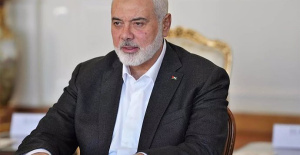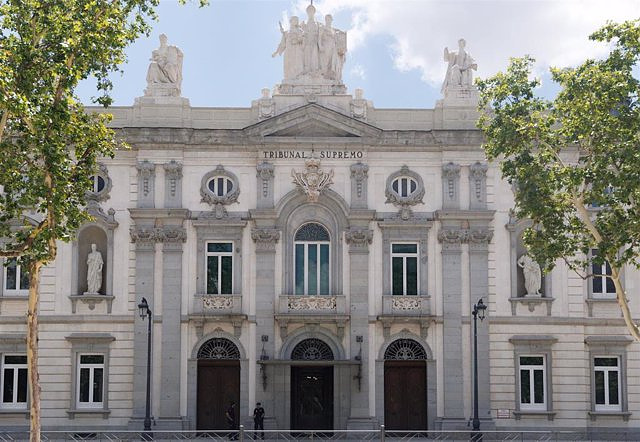This very precautionary measure had been requested by an association that considers that the Government is committing fraud.
MADRID, 7 Nov. (EUROPA PRESS) -
The Supreme Court has refused this Tuesday to immediately suspend the procedure for approving the amnesty law - negotiated by PSOE and Junts -, as requested by the Association for Reconciliation and Historical Truth in an appeal in which it considered that this future norm represents a serious violation of fundamental rights and a fraud on the law.
But the Contentious-Administrative Chamber of the high court rejects these very precautionary measures requested due to lack of justification of the urgency and warns that the appeal "may incur causes of inadmissibility" given that the object may be "outside the jurisdiction of this Chamber" and since the appellant may lack active standing.
This is stated in an order for which Judge Pablo Lucas Murillo was the speaker, collected by Europa Press, in which the Chamber explains that regardless of whether the bill has been presented, "the exercise of the initiative legislative action by the members of the Cortes Generales cannot be prosecuted before the contentious-administrative jurisdiction".
"Nor is it up to the latter to impose on the Government the presentation of bills. In short, the parliamentary action of the Congress of Deputies to which the appellant refers is equally alien to this jurisdictional order since it goes beyond personnel issues, asset management and administration contemplated in article 1.3 a) of the Jurisdiction Law," he adds.
The resolution states that the association's appeal challenged the "material actions of the Government of the Nation and the president - Pedro Sánchez - in relation to the amnesty law" and that of "the Bureau of the Congress of Deputies and its president --Francina Armengol--, in relation to the same point and with the appointment on November 3 (...) of the new Chief Lawyer", Fernando Galindo.
The association's very precautionary measure not only asked that it be agreed that the Government should cease "in the way it was actually committed," but that Galindo should also be terminated and the Executive should be ordered to, if it wanted to approve an amnesty law, would do so through "the presentation before the Congress of Deputies of a formal bill on this matter."
As stated by the Supreme Court, this association considers that "using the means of proposing a law instead of presenting the bill is a legal fraud that violates articles 14 and 23 of the Constitution. And it believes that it is also violates the principle of equality by "forgiving (Catalonia) a debt of 15,000 million euros and processing an amnesty for very serious crimes of a general nature."
As for Galindo, he maintains that he is ineligible for the position given that he has gone "in a few days from the Executive Branch as number two in a Ministry of the Government of Spain, to the Legislative Branch, as a key person in the entire organization chart of Congress."
But the Chamber disgraces the association that the document does not offer justification of the legitimate interest on its part to file an appeal, including that relating to the appointment of the Senior Lawyer of the Congress of Deputies, and adds that before resolving on the initiation of the piece of precautionary measures, it is necessary to hear the appellant, the State Attorney, the Lawyer of the Cortes Generales and the Public Prosecutor's Office about the lack of jurisdiction and the possible inadmissibility of this appeal.

 Exploring Cardano: Inner Workings and Advantages of this Cryptocurrency
Exploring Cardano: Inner Workings and Advantages of this Cryptocurrency Seville.- Economy.- Innova.- STSA inaugurates its new painting and sealing hangar in San Pablo, for 18 million
Seville.- Economy.- Innova.- STSA inaugurates its new painting and sealing hangar in San Pablo, for 18 million Innova.- More than 300 volunteers join the Andalucía Compromiso Digital network in one month to facilitate access to ICT
Innova.- More than 300 volunteers join the Andalucía Compromiso Digital network in one month to facilitate access to ICT Innova.-AMP.- Ayesa acquires 51% of Sadiel, which will create new technological engineering products and expand markets
Innova.-AMP.- Ayesa acquires 51% of Sadiel, which will create new technological engineering products and expand markets Hamas views Israel's latest deal proposal in "positive spirit"
Hamas views Israel's latest deal proposal in "positive spirit" The Ibex 35 rises 0.22% mid-session driven by Aena (4.66) and Sabadell (4.57%)
The Ibex 35 rises 0.22% mid-session driven by Aena (4.66) and Sabadell (4.57%) STATEMENT: Selena Romero and Roberto Pérez winners of the 22nd Nacho Juncosa Memorial - International under-16 tennis tournament
STATEMENT: Selena Romero and Roberto Pérez winners of the 22nd Nacho Juncosa Memorial - International under-16 tennis tournament STATEMENT: DH2 Energy is the winner in the first European renewable hydrogen auction
STATEMENT: DH2 Energy is the winner in the first European renewable hydrogen auction How Blockchain in being used to shape the future
How Blockchain in being used to shape the future Not just BTC and ETH: Here Are Some More Interesting Coins Worth Focusing on
Not just BTC and ETH: Here Are Some More Interesting Coins Worth Focusing on UPV students design an app that helps improve the ventilation of homes in the face of high temperatures
UPV students design an app that helps improve the ventilation of homes in the face of high temperatures Ivace and promotes a less invasive device for the early detection of prostate cancer
Ivace and promotes a less invasive device for the early detection of prostate cancer Valencia unanimously approves the ordinance to allocate spaces to test innovative initiatives
Valencia unanimously approves the ordinance to allocate spaces to test innovative initiatives UPV researchers promote a paid master's degree as a "talent factory" in integrated photonics
UPV researchers promote a paid master's degree as a "talent factory" in integrated photonics A million people demonstrate in France against Macron's pension reform
A million people demonstrate in France against Macron's pension reform Russia launches several missiles against "critical infrastructure" in the city of Zaporizhia
Russia launches several missiles against "critical infrastructure" in the city of Zaporizhia A "procession" remembers the dead of the Calabria shipwreck as bodies continue to wash up on the shore
A "procession" remembers the dead of the Calabria shipwreck as bodies continue to wash up on the shore Prison sentences handed down for three prominent Hong Kong pro-democracy activists
Prison sentences handed down for three prominent Hong Kong pro-democracy activists ETH continues to leave trading platforms, Ethereum balance on exchanges lowest in 3 years
ETH continues to leave trading platforms, Ethereum balance on exchanges lowest in 3 years Investors invest $450 million in Consensys, Ethereum incubator now valued at $7 billion
Investors invest $450 million in Consensys, Ethereum incubator now valued at $7 billion Alchemy Integrates Ethereum L2 Product Starknet to Enhance Web3 Scalability at a Price 100x Lower Than L1 Fees
Alchemy Integrates Ethereum L2 Product Starknet to Enhance Web3 Scalability at a Price 100x Lower Than L1 Fees Mining Report: Bitcoin's Electricity Consumption Declines by 25% in Q1 2022
Mining Report: Bitcoin's Electricity Consumption Declines by 25% in Q1 2022 Oil-to-Bitcoin Mining Firm Crusoe Energy Systems Raised $505 Million
Oil-to-Bitcoin Mining Firm Crusoe Energy Systems Raised $505 Million Microbt reveals the latest Bitcoin mining rigs -- Machines produce up to 126 TH/s with custom 5nm chip design
Microbt reveals the latest Bitcoin mining rigs -- Machines produce up to 126 TH/s with custom 5nm chip design Bitcoin's Mining Difficulty Hits a Lifetime High, With More Than 90% of BTC Supply Issued
Bitcoin's Mining Difficulty Hits a Lifetime High, With More Than 90% of BTC Supply Issued The Biggest Movers are Near, EOS, and RUNE during Friday's Selloff
The Biggest Movers are Near, EOS, and RUNE during Friday's Selloff Global Markets Spooked by a Hawkish Fed and Covid, Stocks and Crypto Gain After Musk Buys Twitter
Global Markets Spooked by a Hawkish Fed and Covid, Stocks and Crypto Gain After Musk Buys Twitter Bitso to offset carbon emissions from the Trading Platform's ERC20, ETH, and BTC Transactions
Bitso to offset carbon emissions from the Trading Platform's ERC20, ETH, and BTC Transactions Draftkings Announces 2022 College Hoops NFT Selection for March Madness
Draftkings Announces 2022 College Hoops NFT Selection for March Madness























